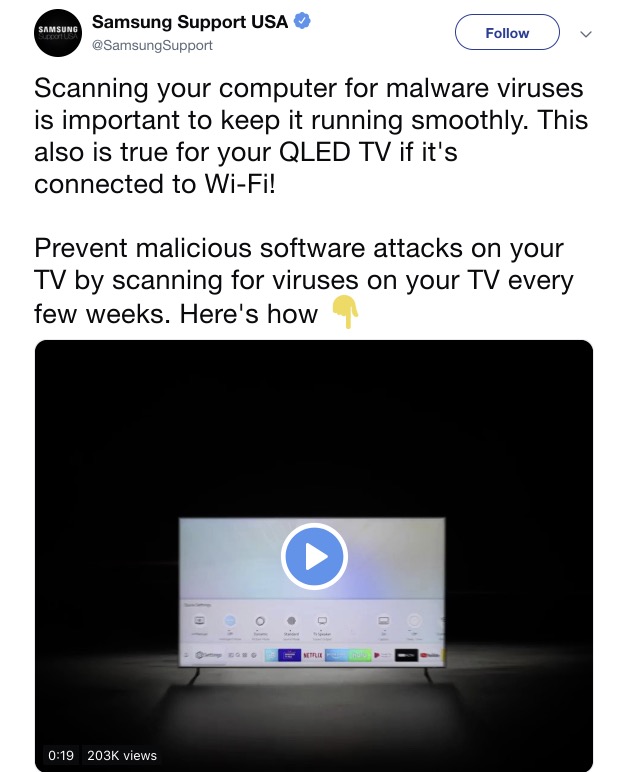Samsung deletes tweet about virus checking smart TVs but should we be worried?
In a (now deleted) tweet, Samsung advised customers to run regular virus checks on their TVs. Here's everything you need to know...


While we readily associate viruses and malicious malware with our computers, and perhaps even our smartphones, it's not often that we think about how best to protect the other devices we hold dear. And even if we did, the vast majority of us wouldn't know where to start when it comes to ensuring our electronics are free from threats.
Well, Samsung have stirred up some controversy of late, having released a – now deleted – Tweet that suggested their range of Smart TVs should be virus checked as often as two weeks.
Find more information on this smart security scandal, as well as our top tips for protecting you smart devices, below. Then, head over to The Hub, our homepage for all things smart home tech advice, information and honest reviews.

This screenshot was captured by the team at Gizmodo, before it was deleted
Perhaps inadvertently, Samsung stirred up some panic amongst their users by suggesting that some of their top performing devices – including the QLED TV – could be subject to infiltration malicious malware. In order to prevent this, the tech giant suggested running anti-virus checks, routinely.
But is there really any need for Samsung Smart TV owners to panic? Well, this is a topic that appears to divide tech producers and experts, alike. At present, we can't be entirely sure about the gravity of the threat, so our advice would be to err on the side of caution.
Not sure where to get started? Follow our top tips, below, to enhance the security of your smart home system.
- Rename your router – we'd recommend opting for something random that doesn't relate to your name, address, or location;
- Change your passwords – this one may seem obvious, but you'd be surprised how many people think 123, password, and the like are strong enough passwords. Something random, with a mix of numbers, letters and symbols is your best bet;
- Keep your software up to date – while it can be tempting to ignore manufacturers' demands to update your software, it could be the case that it's been triggered by a security breech, so is definitely worth your while to oblige;
- Check your settings – don't just assume that your smart system is automatically set up with your best security interests in mind. Take time to make changes that will reduce accessibility.
Looking for more smart home advice?
- Smart assistants – a beginner's guide
- The best smart home tech for your house
- What is a smart washing machine and do I need one?
Get small space home decor ideas, celeb inspiration, DIY tips and more, straight to your inbox!
Emily first (temporarily) joined the Real Homes team while interning on her summer break from university. After graduating, she worked on several publications before joining Real Homes as Staff Writer full time in mid-2018. She left the brand in 2020 to pursue another career, but still loves a second-hand bargain and sourcing unique finds to make her rented flat reflect her personality.
